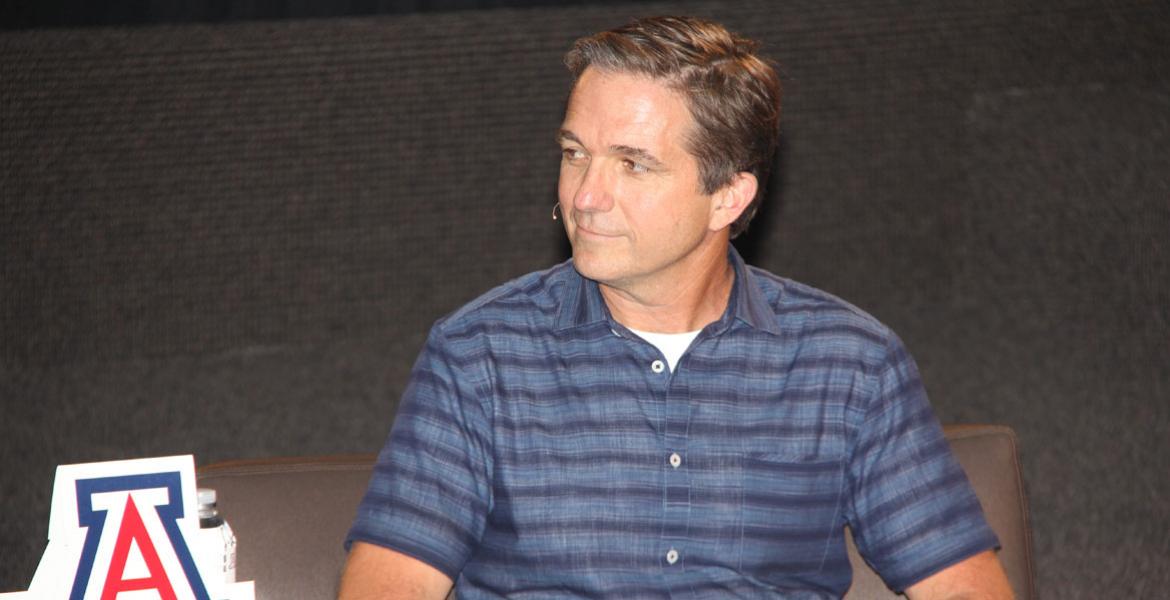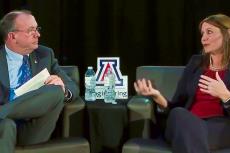The Systems Behind the Snaps
When Jerry Hunter, senior vice president of engineering at Snap Inc., was a student at the University of Arizona, one of his professors told him he wasn’t “professor material.” NASA offered him a job after he finished his master’s degree, but the government cut the organization’s funding, and Hunter ended up waiting tables in Palo Alto, California. When he interviewed for a job at Sun Microsystems, they weren’t interested. It was only when the person they hired didn’t show up for his first day that they called Hunter and told him the job was his if he could show up right away.
Decades later, Evan Spiegel, the future CEO of Snap Inc., was at a mall in Santa Monica, California, trying to hand out fliers to gauge people’s interest in an app that sent disappearing pictures. Not a single person took a flier.
It was only fitting that the resilient Hunter, who earned his bachelor’s degree in systems engineering at the UA in 1988 and his master’s in the same subject in 1990, should end up in leadership at Snap Inc. Hunter returned to the University of Arizona to speak to a room packed with students, alumni, donors, and college faculty and staff, about his trajectory from UA Engineering to his current role at the camera company, best known for the phone application Snapchat. His was the final talk in the college’s 2019 Lessons in Engineering Leadership series.
You can really learn a lot about the way to make things right if you’re just listening.”
"I thought I was going to be an engineer, doing robotics, writing code,” he said of his rise to leadership positions at companies like Sun Microsystems, Amazon and now Snap. “It turned out that organizations are just big systems, and you manage them the same way you would manage any other systems problems. It’s just inputs and outputs.”
Leading Is Listening
Hunter spent more than 16 years at Sun Microsystems, moving to vice president of IT operations, before spending nine years at Amazon and moving on to Snap in 2016. Now that he’s spent years in leadership roles, he says one of the most important things he’s learned is how to listen closely to the people around him.
“It’s easy to slow down what you’re saying and look like you’re listening,” he said. “It’s hard to slow down what you’re thinking and actually listen. But you can really learn a lot about the way to make things right if you’re just listening.”
When his son and daughter, now 21 and 23, were younger, he found himself stressed about balancing work and life, missing events at home and upsetting his family, or missing events at work and upsetting his boss. A life coach helped him figure out how to prioritize. Sometimes that meant leaving work early to catch one of his kids’ games. Sometimes it meant staying late at work for a meeting.
“Health, working out, time with your friends, time with your family: make those a priority, and let work fill in all around it, and it just works,” he said.
Curiosity and determination in the face of problems are also key: He said he’s found almost every problem he’s ever been faced with interesting, whether it was figuring out how to get data centers up and running after a flood in Thailand or how to optimize storage for a cellphone app.
“If you’d asked me two years ago, ‘Tell me your thoughts about managing memory on a phone,’ I’d be like, ‘That sounds kind of boring,’” he said. “But it turns out these problems are actually interesting.”
Coding and Cockroaches
Hunter’s advice to his two children and all of their friends is straightforward: Learn how to code.
“Be whatever you’re going to be, but learn how to code, because everything involves data,” he said.
A recent encounter with a young woman summed up what he was looking for in Snap employees. He ran into her on a staircase, and notice her look of disgust when she saw a dead cockroach on one of the steps. She paused, picked it up and threw it away.
“That’s the type of person who sees a problem, solves a problem,” he said. “And companies are full of problems. I look for people who are technically fearless. People who have that and aren’t afraid to just dig in and figure out what I need to do, whatever it takes to make a problem go. That’s important.”
A native Tucsonan, Hunter said when he started at the UA, he didn’t understand why anyone would go anywhere else for school. His fondness for his alma mater hasn’t changed.
“I feel a lot of success in my life came from what I learned here,” he said.




